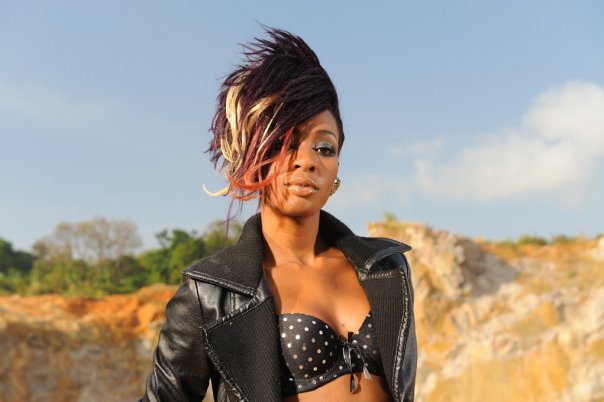Blog August 12, 2014
Artists of Uganda: A Follow-Up
Remember that Uganda Selection Norient released back in early July? Well, since our initial review of it, which delved somewhat into the political goings-on of the country’s music scene, a few loyal readers have drawn our attention to another worthwhile point of discussion: It seems that Norient’s mixtape does little justice to Uganda’s female artists, many to whom the country’s thriving music industry owes a big thanks. We’ve seen a lot of talent coming out of Uganda, especially in these past few years, and it would be a mistake to say that female stars don’t play a role of their own in "Bringing Uganda on the Map".
Of the few female artists featured on the compilation, 27-year-old rapper Keko has arguably broken the most ground. Keko’s 2011 single “How We Do It” took Uganda’s hip-hop scene by storm, and she has since continued to “get her swag on,” maintaining this early level of popularity through her catchy tunes, don’t-mess attitude and lyrical versatility. In her music, Keko tackles subject matter ranging from globally pertinent issues, such as climate awareness and domestic violence, to the music itself. Her 2012 single “Make You Dance” featuring Kenyan MC Madtraxx marks her appearance on Norient’s mixtape, and the track won the 2013 HiPipo Music Awards for Best Hip-Hop Song and Video of the Year.
Another musical pioneer Norient features is computer scientist-turned-world music-songstress Tshila. Tshila defines herself as an "Afro-fusion" artist, creating original blends of traditional African rhythms and instruments, modern hip-hop and spoken poetry. Her 2012 track “Africa Rise” testifies to the success of this unique style, its smooth mixture of reggae and hip-hop helping to underscore the Pan-African lyrical message: she implores all African peoples to rise above their differences and become a united entity, but the song is also about the music itself, "taking African hip-hop from the streets to the top."
Also noteworthy is Uganda’s r&b/dancehall queen Cindy “Cinderella” Sanyu. Cindy began her career as an early member of the Ugandan girl band Blu*3, eventually going solo in 2007. Her debut album Ayokyayokya (2009) topped East African charts for years after its initial release, with many of her subsequent projects enjoying comparable levels of success. Norient’s track of choice was this spring’s “Sample Dat,” a song that speaks to an approach to life that everyone can relate to: “People like to sample something before fully committing.”
If the goal of this post is to give our readers a sense of just how much female artists have contributed to the development of Uganda's vibrant music industry, then Norient’s selection can only be taken as a jumping-off point. Now we turn to some of the major stars whose names didn’t quite make it into the mixtape, but who nonetheless have helped boost Uganda into competition with some of Africa’s larger music markets.
There’s no better artist to start with than 40-year-old r&b/soul star Juliana Kanyomozi, the first female musician to win PAM’s Artist of the Year Award. She did so for two consecutive years, in 2008 and 2009, and she now has over 10 PAM Awards to her name. After rising to fame as one half of the duo I-Jay, Juliana had two big breaks that carried her to the top: “Taata Wa’baana Yaani?” (Who is the Father of the Kids?), a collaboration with Ugandan musician Bobi Wine, and “Nabikoowa” (I Got Tired of It), one of her early singles. Her most recent top-seller was last year’s “Eddiba,” which won the 2014 HiPipo Music Award for Best Female Afro-Beat Song.
Another big name on the scene is Rema Namakula, an r&b artist who actually started out as a backup singer for Bebe Cool’s Gagamel Entertainment Group. In 2013, Cool booted Rema from the group upon learning that her plan to launch a solo career was already partly underway. (This hasty move on Cool’s part shouldn’t come as a surprise to those of you who read our July review of Norient’s mixtape in which we discussed his unabated rivalry with singer Jose Chameleone.) It took Rema less than a year to gain national popularity, her second single “Kukaliba” (2013) landing her the 2014 HiPipo Music Award for Best Female r&b Song.
Lastly we have Angella Katatumba, an r&b/soul singer whose debut album Peace, which included two duets with Bebe Cool, really put her on the map in 2006. Since then, she has been known as much for her humanitarian triumphs as she has been for her musical ones. Like Keko and Tshila, her songs address issues from peace reconciliation to environmental awareness. But lyrical consciousness is not the extent of Angella's philanthropic efforts: In 2010, she founded the Angella Katatumba Development Foundation, a charity organization that raises funds for those affected by the ongoing wars in Uganda. Also in 2010, the British Council appointed Angella Uganda’s International Climate Change Icon, a position coveted by local musicians.
The way we see it, Uganda's music market would not be where it is today if it wasn't for these and many other female artists. And on that note, we at Afropop would not be where we are today if it wasn't for the help of our devoted fans. It was your feedback that landed us back on the music of Uganda, and it is your feedback that will continue to open our ears to new talking points in the future. Keep up the good work!








